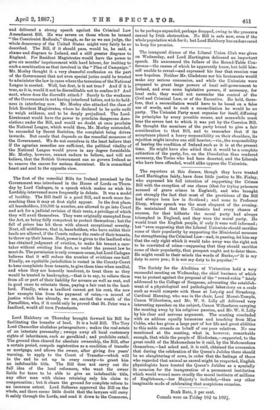The reporters at this dinner, though they have treated Lord
Hartington fairly, have done little justice to Mr. Finlay, who expressed his full intention of supporting the Crimes Bill with the exception of one clause (that for trying prisoners accused of grave crimes in England), and who brought out strongly the fact that most of the provisions of the Bill had always been law in Scotland ; and none to Professor Dicey, whose speech was the most eloquent of the evening. He maintained that the Unionists had every chance of success, for that hitherto the moral party bad always triumphed in England, and they were the moral party. He would trust the English people, if only it were well informed ; but "even supposing that the Liberal Unionists should sacrifice some of their popularity by supporting the Ministerial measure for strengthening the Criminal Law—and, in passing, let him say that the only right which it would take away was the right not to be convicted of crime—supposing that they should sacrifice some of their popularity, that prospect ought not to deter them. He might recall to their minds the words of Burke,—' It is my duty to serve you ; it is not my duty to be popular.'"


































 Previous page
Previous page